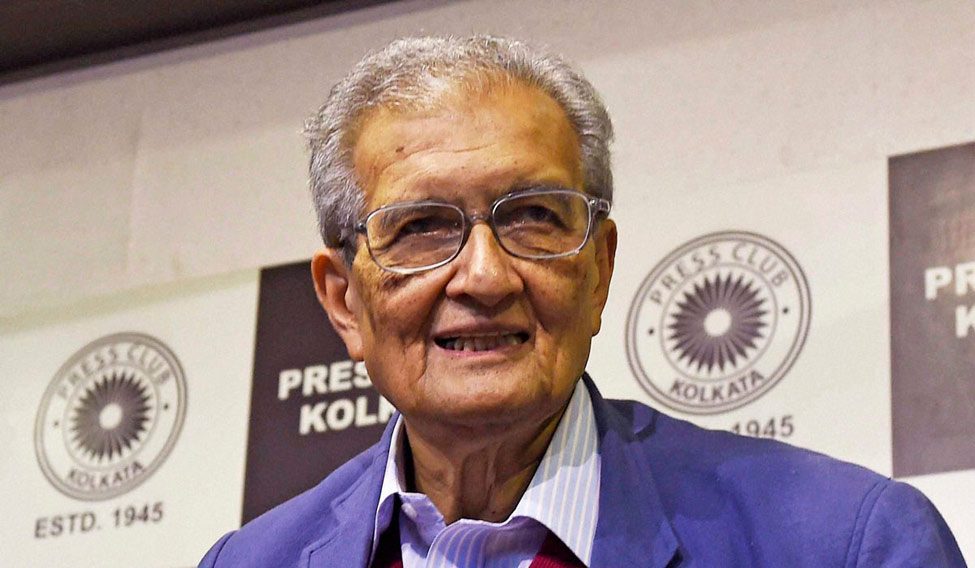Nobel laureate, and one of the most respected economists in the world, Amartya Sen urged the audience to demand for better healthcare while speaking on the topic “Healthcare for All — Why and How” at Tata Memorial hospital’s Platinum Jubilee conference in Mumbai.
The 83-year-old revealed that he is a cancer survivor, who battled against oral cancer at the young age of 18. He criticised the media and also highlighted the apathy of the common man and Indian government when it comes to healthcare issues. “Daily newspapers and publications gave only 1 percent of the total editorial space to health stories in a period of six months in 2012. This is particularly striking, considering that there was so much happening in health policy at the time. Even during the 2014 elections, neither one of the parties brought up healthcare issues,” observed Sen.
He started his speech by saying that the economic growth over the last few decades was often celebrated. “However, India’s performance stands not at the top of the world league, but at the bottom. It is very important to be aware of the fact that the economic progress in India has been extraordinarily limited,” he said.
He compared India to China, saying that the public revenue in China was generated by value economy growth, which has been used to massively expand social as well as physical infrastructure in a determined and well-planned way. “China’s achievements in longevity, literacy, child under nourishment, maternal mortality and other socio indicators has pushed the country to a position far above India,” added Sen.
He informed the audience that while India has been overtaking other countries in the progress of its income, it has been largely overtaken in terms of social indicators by many of the same countries. He spoke about how, within the region of South East Asia itself, the much poorer economy of Bangladesh has caught up with and surpassed India in terms of many social indicators including life expectancy, immunisation of children, infant mortality, child under nourishment, girls’ schooling and sanitation facilities.
“In all these respects, Bangladesh is way ahead of India. The fact that Bangladesh’s per capita income is only half of that of India’s has not prevented it from offering better living conditions than India. Even in Nepal, where the average income is only 1/3rd of what we have in India, it fares better in many social indicators,” he said.
“A couple of decades ago, India had the second best social indicators among the six South Asian countries, including India, Bangladesh, Pakistan, Sri Lanka, Nepal and Bhutan. It is now among the second worst, ahead only of one country, our troubled neighbour Pakistan,” added the Nobel laureate.
He further said that, in terms of the game of snakes and ladders, India’s income level climbed ladder over the last half century, but the snake swallowed health and education. Sen informed the audience about how the new income generated by economic growth in India has been shared unequally. “More importantly, the resources that have been newly created have not been utilised adequately to relieve the gigantic social deprivation of the underdogs of the society. There’s a lot to be done both in terms of economic growth, enhancing the living conditions of the poor and reducing the massive inequality that characterizes India’s economy about which Dr B.R.Ambedkar warned us when India established its democracy.”
Sen’s concluding remarks were as follows:
- Healthcare should include social detriments of health such as nutrition, sanitation and social equity
- A higher proportion of GDP should be devoted to public healthcare. India spends only 1% of its GDP on healthcare as compared to China that spends 3% and Zambia that spends a high as 11% of its entire budget on healthcare. He further said that in India, a lot of the GDP is wasted in a peculiar way
- The exploitation of poor, ignorant patients by private doctors has to stop. During his speech, Sen attacked doctors from private hospitals and said that many of them know extraordinarily little. “When you combine quackery with crookery, you can have alarming results,” says Sen.
- Public healthcare demands a better work ethics. Initiatives have to be taken to bring about a change
- The “moral hazard” involved in subsidizing private hospitals for unverified treatments (as in Rashtriya Swasthya Bima Yojna) needs radical reform. He commented on how a large number of women underwent unnecessary hysterectomies so corrupt doctors could make a lot of money through RSBY
- More recognition needed for central role of public healthcare





